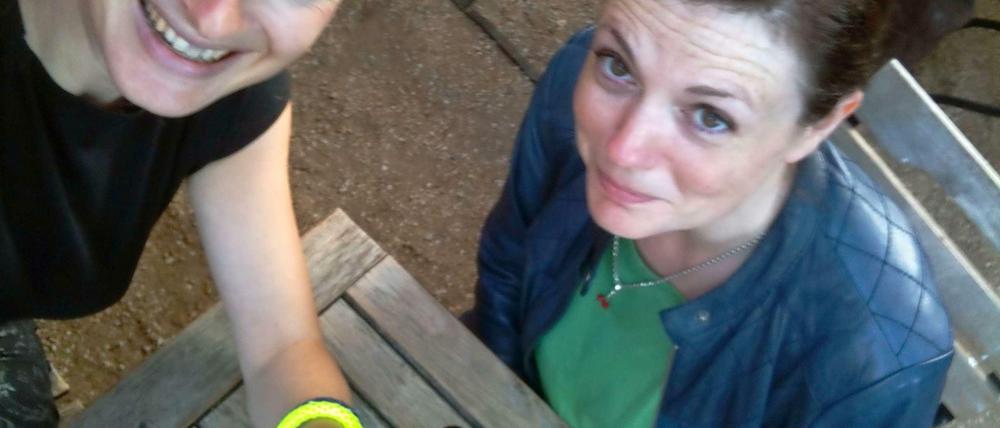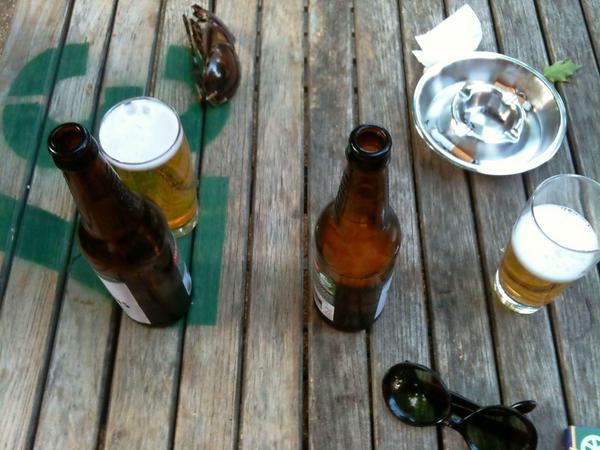
© Privat
Going Dutch with German Writers (9): Biergartens? Very dull places!
Where to meet an Austrian writer and artist in Berlin? A biergarten seems a good idea to begin with, if only Teresa Präauer and Katy Derbyshire didn’t long for something a little more louche. Still, hairdos, anticipatory plagiarism, non-ponds and non-adultery give them plenty to talk about over beer and pastis.
Who?
Teresa Präauer is an Austrian writer and artist. Her book Für den Herrscher aus Übersee won last year’s Aspekte Prize for debut novels, an award well worth having. She’s currently staying at the Literary Colloquium in Berlin.
Where?
Schleusenkrug biergarten, Berlin-Tiergarten
What?
Beer, Fernet Branca, pastis
What did we talk about?
Our first real subject is hairstyles. Teresa has an impressive up-do, which makes her look very sophisticated. The adjective bird’s-nest sounds too negative but is actually very fitting, as Teresa is very fond of birds. I’m just dipping a toe into the world of up-dos, what with not having very long hair. She’s been practicing for about ten years, so she’s very expert and offers to fix my hair if it does indeed start falling down, as I fear. I tell her how discovering the world of YouTube amateur hairstyle videos has reaffirmed my faith in humankind. All those women who share styling tips out of the goodness of their hearts! Teresa points out that they might actually make it big and get offered sponsorship by hair product companies, but I don’t let it cloud my rosy view.
We talk a little about her book. I’ve just read it and thoroughly enjoyed it. People tend to interpret what they like into it, Teresa says. The narrator might be a boy and might be a girl, and actually it doesn’t matter in the slightest, but almost everyone seems to assume one or the other. I spotted all kinds of stories in it, which Teresa denies having read, of course. There’s a brief excursion into the complicated structure of fairy tales – some of them are like road movies, Teresa says, with the hero following a linear quest or path, and the idea gets me quite excited.

© Privat
I ask Teresa where she’s from and get a long list of places in Austria I’ve never heard of. Moving around as a child made school difficult, because most lessons took place in various dialects she didn’t understand well. But I suspect it’s given her that skill of getting on with people quickly, knowing how to fit in with new groups. She’s certainly charming and witty. We talk about humour: German, Austrian and British. Oh yes, it’s terribly important but in fact, I say, I’ve found many funny Germans over the years, despite the cliché.
A group of rather noisy young people have squeezed in at our table. We can’t help eavesdropping but it’s all rather banal. I do worry for a moment that they might consider our conversation rather pretentious, but in the end my antipathy towards them cancels that out. We hop to the next vacant table as soon as possible, finally free to talk as much tipsy crap as we like.
And so on to the subject of Yiddish folk songs. I tell Teresa about one where the singer asks where his shtetl has gone. It’s a song from the 1920s about how the past tends to disappear – or that’s how I interpreted it – but of course now it has a very different meaning. And the singer asks, where is the pond, where is the tree, where is the girl I loved, and so on, and then answers, in my mind they still exist. Teresa gets philosophical (our second round of beers) and ponders on all the things that exist in minds, like non-ponds and non-trees, and applies the idea to God, who must exist, she says, if there’s a non-God in our minds. Non-God and God, she says, are the same thing. A convinced but non-evangelical atheist, I steer the topic towards linguistic purists who say, but that word doesn’t exist. That annoys both of us: if I’ve just used a word, of course it bloody well exists! Laughing, we imagine the trouble such po-faced purists would have with non-trees.
Riding the wave of nostalgia

© Privat
Does she worry about making a living from writing, I ask. Not so much, Teresa tells me, because she has her fine art side too. And she can always get a job at a university, maybe teaching poetic ornithology. Has she been to the Naturkundemuseum here yet? Oh, she must, but not in the school holidays. Jonathan Franzen held a talk there on ornithology and the tickets sold like hot cakes. Jonathan Franzen is a bird fancier too? Oh yes, AND he’s translated Karl Krauss. Teresa is annoyed. How dare he? Was it Karl Krauss who invented the idea of anticipatory plagiarism, she asks (and that’s a tough phrase to pronounce in German). I’ve never heard it before but I’m instantly enchanted. Anyway, that’s what that Jonathan Franzen’s gone and done, occupying the field of poetic ornithology before Teresa could possibly get there.
It’s getting cold and we’re sitting in a draught, so we move inside the small building with the bar in it. Time to switch drinks, to fernet. Fernet is not really the kind of thing to drink in a biergarten and it instantly changes our mood. I just looked it up; there’s a bottle of Fernet Branca in Tender is the Night, for God’s sake! The decor inside the bar is dark with patina and we slouch low in our seats; Teresa takes her shoes off. Looking out through the front window, we suddenly find biergartens very dull places. Nothing sordid could ever happen in a biergarten, says Teresa; there’s no adultery here. We watch a woman who seems to be coming on to two men, and we get momentarily excited as she hugs one of them goodbye for longer than necessary. But no, they part ways and go home in different directions. I tell my fernet story, which involves a Czech wedding, adultery, a kilt, and a bridesmaid with a black eye.

© Privat
Our hairstyles are looking a little frayed after the draught but we’re still holding it together. Another drink! But what? Pastis. Pastis seems like a good idea. And it’s delicious. Teresa gets hiccups but we don’t know each other well enough to apply the only failsafe cure I know. Next time, she says, and the hiccups go away of their own accord. They’re playing really great music behind the bar, soulful but modern, and I ask what it is, and the reticent barman says it’s a podcast, and Teresa is dancing and I’m listening and smiling, and there’s a DJ talking in between and it’s a London pirate station, déja vu fm, and the DJ’s accent reminds me of home, and I’m riding a wave of nostalgia and talking about pirate radio playing crackly vinyl in the 90s, and then Teresa brings me down to earth, laughing, by saying the only pirate radio station she knows is the one in the cheesy film with Mike Krüger and Thomas Gottschalk. Ouch.

© Privat
I think we talk more, or maybe we just sit there finding ourselves fabulous for a while longer. Certainly if we do talk more I can’t remember what it was about, but I do have a general feeling of confidence and warmth and contentment. The biergarten, being a very dull institution, is emptying rapidly. Another drink! But what? As it turns out, pastis wasn’t a very good idea after all, because there’s nothing in the whole world one can possibly drink after pastis, apart from more pastis perhaps. But our tongues are already numb and Teresa mustn’t miss the last train back to Wannsee, so we decide to be good little biergarten girls and go home. And so we do.
Hangover?
Not so bad physically, but I have a killer mental hangover occasioned by the fact that life doesn’t consist solely of mild evenings spent in good company.
- showPaywall:
- false
- isSubscriber:
- false
- isPaid:
- showPaywallPiano:
- false